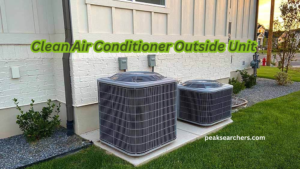How To Clean Air Conditioner Outside Unit – A DIY Solution
An air conditioner is required by every person in summer as it keeps the temperature cold. It helps to keep your home cool and comfortable even when the temperatures outside are soaring high. However, to ensure that your AC unit works efficiently, you need to take good care of it. This includes regular cleaning and maintenance of its outdoor unit.
The outdoor unit of an air conditioner is exposed to various elements such as dirt, dust, debris, and even pests like rodents. If left uncleaned for long periods, it can affect the functioning of the entire system leading to higher energy bills and costly repairs. Hence, it is crucial to clean your air conditioner’s outdoor unit regularly.
It’s important to wash your outdoor unit regularly. I am also used to it. Without cleaning it, we cannot get clean air. Let’s dive in to clean out the outdoor unit.

Gather Supplies:
To clean your air conditioner outside the unit, you will need a few supplies. First on the list is a garden hose with a spray nozzle attachment. This will be used to rinse off debris and dirt from the coils and fins of the unit.
Additionally, you will want to have a cleaning solution such as an all-purpose cleaner or specially formulated AC coil cleaner, which can be found at most hardware stores. A soft-bristled brush or old toothbrush can also come in handy for scrubbing away stubborn debris.
Another useful tool to have is a pair of gloves to protect your hands during the cleaning process. You may also want to wear safety goggles in case any debris flies up while you are spraying down the unit with water pressure.
Lastly, it’s important to have access to an electrical outlet nearby so that you can safely turn off power to the unit before beginning your cleaning process and test it after finishing up. With these supplies in hand, you’ll be ready for a successful DIY cleaning experience!
Step 1: Turn Off the Power
Step 1 in cleaning your air conditioner outside unit is to turn off the power. You can do this by turning off the circuit breaker or switch that controls the power supply to your AC unit.
Turning off the power ensures that you won’t accidentally get electrocuted while cleaning your AC unit. It also prevents any damage to your AC system, keeping you from having to spend money on costly repairs.
Once you’ve turned off the power, it’s also a good idea to put a note or reminder on the switch or breaker box so nobody turns it back on while you’re working on your AC unit. Taking these simple steps will give you peace of mind and make sure that your cleaning job goes smoothly and safely.
Step 2: Remove Debris & Leaves
The next step in cleaning your air conditioner outside the unit is to remove debris and leaves. These can accumulate over time, especially during the fall season. First, turn off the power supply to the unit before you start removing any debris or leaves. This is important for safety reasons.
Next, use a soft-bristled brush or vacuum cleaner to gently remove any dirt, dust, and debris that has accumulated on the exterior of the unit. Be careful not to damage any delicate parts of the unit while doing this.
If there are large clumps of leaves or debris stuck in between the fins of your air conditioner outside unit, you may need to use a garden hose with low pressure to wash them away.
Do not use high pressure as this can bend or damage the fins and affect their performance. Once all debris has been removed from your air conditioner outside unit, move on to step 3.
Step 3: Spray with Hose & Brush
After turning off the power supply, spray the outside unit with a garden hose to remove any large debris and dirt. You can also use a pressure washer for this task, but be careful not to damage any of the delicate parts of the unit. Once you’ve sprayed it down, scrub away any remaining dirt and grime with a soft-bristled brush.
Be sure to pay special attention to the fins on the fan as they can easily get clogged with debris, reducing airflow and efficiency. Use gentle but firm strokes to avoid bending or damaging them. If there are still stubborn spots that won’t come off after brushing, try using a cleaning solution specifically designed for air conditioner units.
When finished cleaning, rinse thoroughly with water and allow it to dry completely before restoring power. It’s important to keep up with regular maintenance like this in order to prolong the life of your air conditioning unit and ensure optimal performance during those hot summer months.
Step 4: Rinse and Inspect Unit
After the initial cleaning with a vacuum and brush, it’s time to rinse the outside unit of your air conditioner. Using a garden hose on low pressure, gently spray down the unit from top to bottom. Be sure not to use high pressure that can damage delicate parts or push dirt further into the system. Rinse until all soap residue has been removed.
Once you’ve rinsed away all dirt and debris from the outside unit, take some time to inspect it thoroughly. Look for any signs of damage or wear such as bent fins, cracks in the housing, or loose connections. Check for any signs of rust or corrosion that may indicate water is getting inside the unit and causing problems.
If you notice any issues during your inspection, it may be best to call in a professional HVAC technician for repairs before turning on your air conditioner again. Otherwise, proceed to reassemble your outside unit by replacing any covers and securing them tightly with screws or other fasteners. With proper cleaning and maintenance, your air conditioning system will run more efficiently and last longer!
FAQ’s
1. How often should I clean the outside unit of my air conditioner?
It’s recommended that you clean your air conditioner’s outside unit at least once a year. You should do it before the start of the cooling season. However, if you live in an area with heavy foliage or have pets that shed a lot, it may need to be cleaned more frequently.
2. What tools do I need to clean my air conditioner’s outside unit?
You will need a few basic tools to clean your air conditioner’s outside unit: gloves, safety glasses, a screwdriver or wrench (depending on your unit), a garden hose with a spray nozzle attachment and coil cleaner solution.
3. Can I use regular soap and water to clean my air conditioner’s outside unit?
No, using regular soap and water is not recommended for cleaning your air conditioning system. Instead, use a coil cleaner solution specifically designed for cleaning AC units; it can be purchased from most hardware stores.
4. Is it safe to pressure wash my ACs outside unit?
Pressure washing is not recommended as it can cause damage to the delicate fins on the condenser coils. It can lead to reduced efficiency and premature failure of your system.
5. Can I just remove debris by hand instead of using a hose?
While removing debris by hand may seem like an easy option, it does not effectively remove all dirt and grime build-up inside the coils which is important for maintaining optimal energy efficiency in your cooling system.
Also read: How To Fix Your Air Conditioner Thermostat In Five Minutes
Conclusion
In conclusion, it is important to make sure that you enjoy your clean AC. After all the effort that has been put into cleaning the outside unit, it is only fair to enjoy the results. A clean air conditioner will give you cleaner and fresher air throughout the year. It will also help in reducing energy consumption, which in turn saves money on utility bills.
Besides enjoying a cleaner and more efficient AC, regular maintenance and cleaning of your outside unit also prolongs its lifespan. This means fewer repairs are needed and less money is spent on replacements. Therefore, taking care of your air conditioner not only benefits you but also helps preserve our environment by reducing energy consumption.


